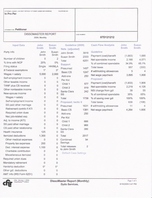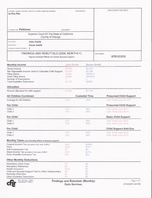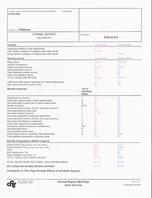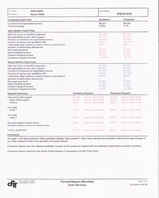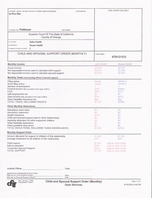Spousal Support
Many different circumstances will affect your spousal support payment. These may include length of marriage, earning potential of partners, education, assets of partners, etc.
Spousal support is determined by the court when a couple obtains a divorce or separates. The goal of spousal support is to be able to provide both parties with as close as possible standard of living as they were previously accustomed.
This amount is generally determined by a court-approved software program, such as the Xspouse™ program, which determines the guideline spousal support amount. The “final” or “permanent” support amount may take into account other circumstances that may increase or decrease the guideline spousal support amount. These circumstances may include:
- Length of marriage or partnership
- Standard of living
- Earning capacities of parties involved
- Personal debts
- Assets of parties
- Education of parties
- Will any education or job training be needed for parties to become employed
- If children are involved, would having a job interfere with raising of children
- Did either party take a leave from employment to provide childcare for children of the relationship
- Tax consequences of spousal support on both parties tax liabilities.
The most logical place to start when trying to determine your spousal support is with a California Guideline Support calculation done with the Xspouse™ program. The Xspouse™ program has been used for over two decades to determine guideline child and spousal support payments. Our company has almost three decades of experience using the DissoMaster™ and Xspouse™ programs. We can put that knowledge toward finding the best support payment for you.
We can provide you with a report for just spousal support, or both child and spousal support. This will give you a good indication of where you stand financially and you can determine what actions you are going to take.
California Family Law Code states this about spousal support:
4320. In ordering spousal support under this part, the court shall consider all of the following circumstances:
(a) The extent to which the earning capacity of each party is sufficient to maintain the standard of living established during the marriage, taking into account all of the following:
(1) The marketable skills of the supported party; the job market for those skills; the time and expenses required for the supported party to acquire the appropriate education or training to develop those skills; and the possible need for retraining or education to acquire other, more marketable skills or employment.
(2) The extent to which the supported party’s present or future earning capacity is impaired by periods of unemployment that were incurred during the marriage to permit the supported party to devote time to domestic duties.
(b) The extent to which the supported party contributed to the attainment of an education, training, a career position, or a license by the supporting party.
(c) The ability of the supporting party to pay spousal support, taking into account the supporting party’s earning capacity, earned and unearned income, assets, and standard of living.
(d) The needs of each party based on the standard of living established during the marriage.
(e) The obligations and assets, including the separate property, of each party.
(f) The duration of the marriage.
(g) The ability of the supported party to engage in gainful employment without unduly interfering with the interests of dependent children in the custody of the party.
(h) The age and health of the parties.
(i) Documented evidence of any history of domestic violence, as defined in Section 6211, between the parties, including, but not limited to, consideration of emotional distress resulting from domestic violence perpetrated against the supported party by the supporting party, and consideration of any history of violence against the supporting party by the supported party.
(j) The immediate and specific tax consequences to each party.
(k) The balance of the hardships to each party.
(l) The goal that the supported party shall be self-supporting within a reasonable period of time. Except in the case of a marriage of long duration as described in Section 4336, a “reasonable period of time” for purposes of this section generally shall be one-half the length of the marriage. However, nothing in this section is intended to limit the court’s discretion to order support for a greater or lesser length of time, based on any of the other factors listed in this section, Section 4336, and the circumstances of the parties.
Xspouse™ Support Calculation for $49.95
***Up to 10 revisions to your report at no additional charge!***
Order Your Xspouse™
We take payment by Major Credit Card, PayPal® or eCheck.
![]() Email us at orders@childsupportca.com
Email us at orders@childsupportca.com
.


